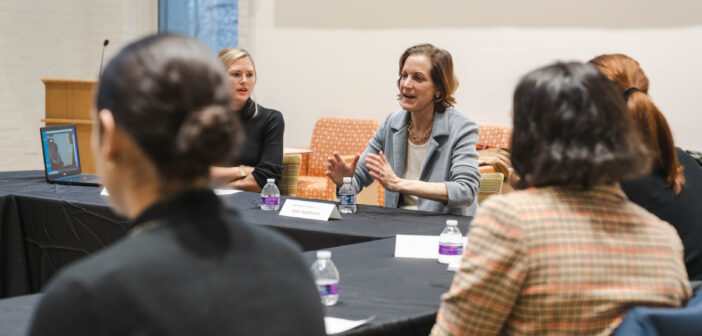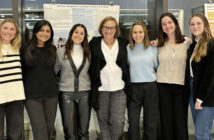Before Lehigh’s 2023 Kenner Lecture on Cultural Understanding, Pulitzer Prize winning historian, journalist, commentator on geo-politics and keynote speaker Anne Applebaum instigated a discussion with a select group of wide-eyed, notebook-wielding students.
The roundtable discussion, which occurred in Williams Hall’s Global Commons, centered on communications and world politics.
“The story never ends,” Anne Applebaum said about the outlook of democracy.
After the discussion, The Brown and White spoke with Applebaum about her career and opinions on the current political landscape.
Q: What are the most rewarding aspects of your work?
Anne Applebaum: I’ve done a lot of really different things. I write very long history books, and I also write articles that take 15 minutes, and I’m lucky that I’ve been able to do both. Sometimes the thing that takes you the fastest is the thing that’s No. 1 on the Atlantic website. You have no idea. I think probably the rewarding things are when people say to me, “You changed my mind,” or “You made me think about it in a different way.” Or when something you put a lot of effort into, something that seemed obscure, suddenly becomes relevant. You can’t always predict it, and nobody can.
Q: What are the most challenging aspects of your work?
AA: Both the disinformation that we’ve already discussed, but also anybody nowadays who is a public figure of any kind, however insignificant, is liable to become a target of a smear campaign, or hate, or trolling campaign on the internet. It’s happened to me more than once, and it’s very unpleasant. I will not deny it and afterwards have learned to get used to it. The first 20 years I was in journalism, that never happened, and it happens now, in the last decade, and you just have to be ready for it.
Q: What would you say is the significance of global study and international perspectives?
AA: The most interesting development of the last several years is how similar politics have become in very different places. The way this kind of politics works in Poland and the way it works in the United States is alarmingly similar. So, these are completely different countries with nothing in common historically, politically, demographically, geographically, linguistically, religiously — nothing. It’s very useful, even if you’re a student of American politics, to study what’s happening in other places because you will find parallels in other countries.
Q: What would you say is the significance of interdisciplinary and cross curricular study?
AA: Ultimately, everything is cross-curricular and interdisciplinary. If you want to understand what happened during the Russian Revolution 100 years ago, or whether you want to understand what happened in Washington last week, you should be able to look at it from different perspectives. You should be able to be a historian, and you should be able to be a sociologist, and you should be able to be an artist or somebody with some kind of aesthetic appreciation. I’m not against specialization, but ultimately, one of the great things about American liberal arts education … is that it gives you this possibility of taking a course in psychology or in philosophy or in art or something that will give you a different way of thinking about whatever is your main subject.
Q: As journalists whose work often feels under attack, especially now due to disinformation, what advice do you have for maintaining sustainable and healthy journalism and journalists?
AA: It’s very important for journalists to understand why they’re being attacked. Think about: Who are the audiences? Who are listening to you? Who are the audiences who might listen to you? Who are the ones who won’t listen to you? And think about how to reach them. What’s the way in which you can reach the people who are skeptical? Do you have to enter into their mindset? What part of their worldview do you have to appeal to? I started at the Think Tank (Panel) that is now at Johns Hopkins. We’ve looked a lot at audiences and how audiences react to different kinds of journalism or different kinds of campaigns. You can’t assume anymore that just because you’re a journalist, or just because it’s been published in a newspaper, that people think it’s true. So, what is it? What is it you need to do to build trust among your readers?
Q: What would you say to someone who struggles with consuming news media, whether it be because of media fatigue, media literacy or other?
AA: News consumption is now much more difficult than it used to be — just as writing is more difficult. To be an intelligent news consumer, you probably now have to read a pretty wide range of things. You need to acquaint yourself with the nature of the publications you’re reading. It’s very easy — and all of us are fooled by it sometimes — to see something fly by you on some form of social media and believe it. But you didn’t look at where it was coming from, and you didn’t look at who wrote it. …If you want to have an accurate understanding of the world, then you should know where your information is coming from.
Q: What role do journalists and politicians play in media literacy?
AA: I don’t want to speak in an overly general way about what journalists should do. But, I still think there is some power to the truth. When you are convinced you have found a piece of information or a way of seeing the world that is true — and you put the effort into conveying that to your readers — it’s both personally satisfying, and I think you can convince people. Making that the goal of what you do is still worthwhile.
Q: What is one thing you want power holders to know? What would you like to say to them?
It is important to remain optimistic — to remember that nothing is preordained and history isn’t ever written in advance. There’s no rule that says democracy has to decline, or that our civilization has to decline, or the city of Bethlehem has to decline. Everything that happens tomorrow depends on what we do today. Of course, there’s nothing that says that democracy has to survive, or the city of Bethlehem has to prosper. Those things will only happen if you make them happen. Nothing is inevitable — neither success nor failure. So, everyone is responsible for making sure that things go better rather than worse.






Comment policy
Comments posted to The Brown and White website are reviewed by a moderator before being approved. Incendiary speech or harassing language, including comments targeted at individuals, may be deemed unacceptable and not published. Spam and other soliciting will also be declined.
The Brown and White also reserves the right to not publish entirely anonymous comments.